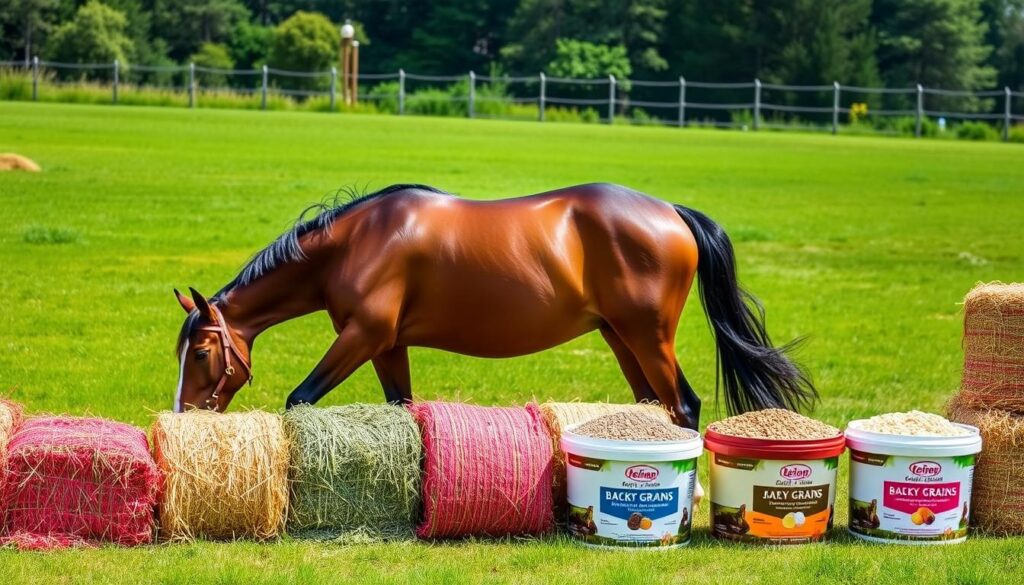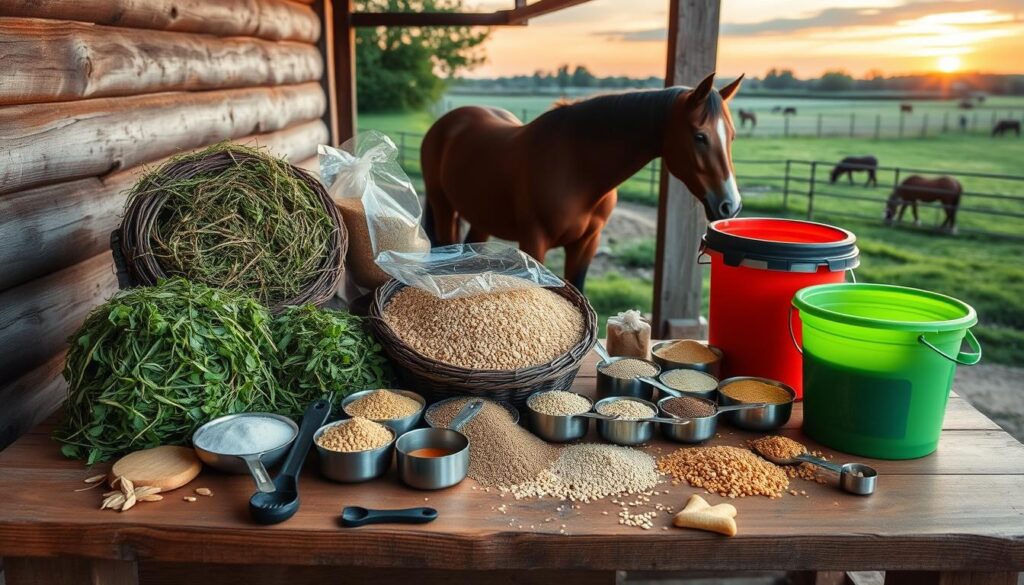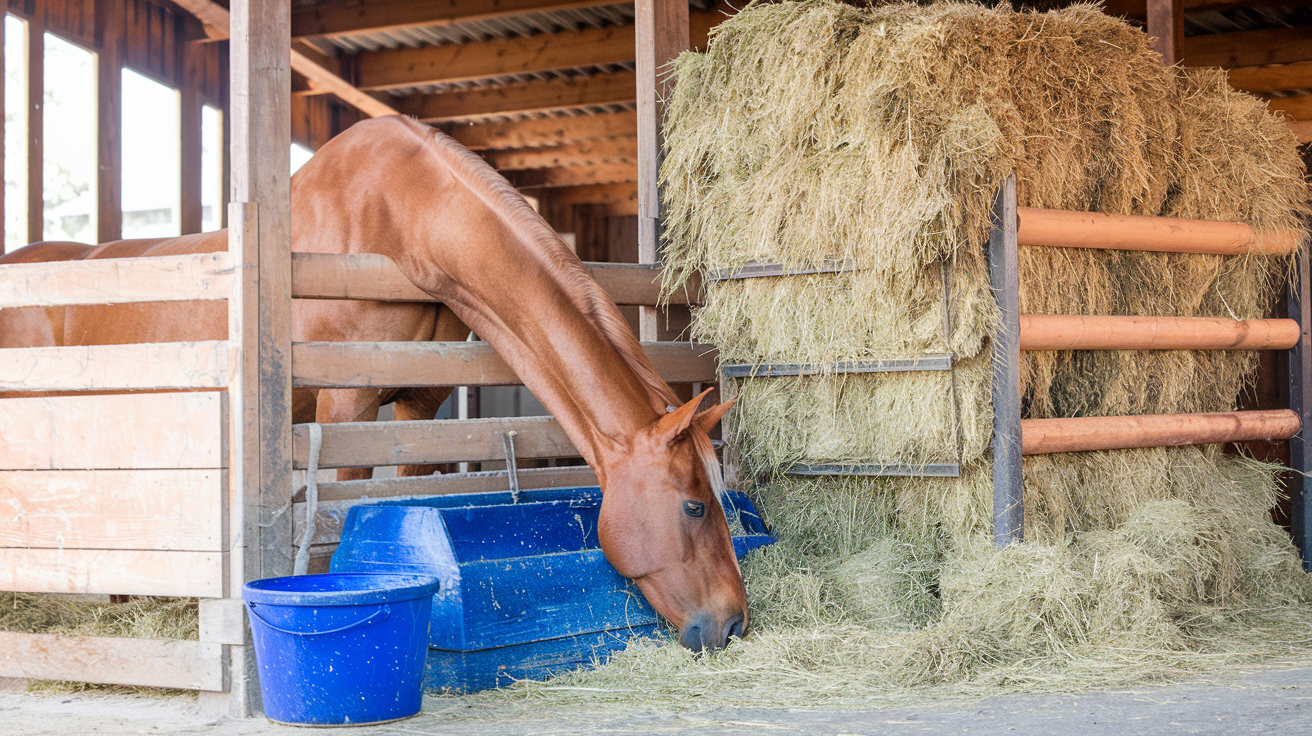Proper nutrition is key for a horse’s health and happiness. Knowing how horses behave and think is important. A good diet keeps horses healthy and happy. For tips on feeding your horse right, check out this horse nutrition guide.
Introduction to Horse Nutrition
Knowing how diet affects a horse’s health is vital for owners. By understanding nutrition, owners can create a diet plan that fits their horse’s needs. This includes considering the horse’s behavior and psychology for a personalized diet.
Key Takeaways
- Proper nutrition is essential for maintaining the overall health and well-being of horses.
- A well-balanced diet affects both physical and mental health in horses.
- Understanding horse behavior and horse psychology is crucial in creating a customized feeding plan.
- A balanced diet can help prevent health issues in horses.
- Owners should consider individual horse needs when creating a feeding plan.
The Foundations of Equine Nutrition
Knowing the basics of equine nutrition is key to keeping horses healthy. A horse’s diet greatly affects its health. A balanced diet can improve how horses behave and communicate.
Horses have special digestive systems. Their nutritional needs are different from other animals. A balanced diet gives them the nutrients they need to stay healthy.
Basic Nutritional Requirements
Horses need different nutrients based on their age, breed, and activity level. Young horses need more protein and calories for growth. Older horses need less protein and more fiber for their digestive health.
Understanding Digestive Physiology
Horses digest plant-based foods in a unique way. Their digestive system includes a large cecum. This part of the large intestine houses microbes that help break down fiber-rich foods.
Importance of Balanced Diet
A balanced diet is vital for a horse’s health. A diet lacking essential nutrients can cause malnutrition and behavioral problems. A balanced diet supports health, improves behavior, and enhances communication between horses and their owners.
By knowing what horses need and the importance of a balanced diet, owners can ensure their horses stay healthy. This improves the bond between horses and their owners, creating a stronger connection.
| Nutrient | Importance |
|---|---|
| Water | Essential for hydration and digestive health |
| Carbohydrates | Provide energy for the horse’s body |
| Proteins | Build and repair tissues in the horse’s body |
| Fats | Provide energy and support skin and coat health |
| Vitamins and minerals | Support immune function and overall health |
Essential Components of a Horse’s Diet
A horse’s diet includes proteins, carbohydrates, fats, vitamins, and minerals. It’s important to know these to give a balanced diet. A horse’s natural instincts guide their dietary needs. Proper nutrition shows in their horse body language.
Experts in equine nutrition say a horse’s diet should match their age, breed, and activity level. A balanced diet with various nutrient-rich foods supports a horse’s health. Key components are:
- Proteins: essential for building and repairing tissues
- Carbohydrates: provide energy for the horse’s body
- Fats: important for energy and nutrient absorption
- Vitamins and minerals: necessary for various bodily functions
Understanding a horse’s dietary needs helps support their health. A horse’s horse body language shows their nutritional needs. By paying attention to these cues, owners can make better diet choices. A balanced diet and understanding horse instincts help horses thrive.
Understanding Different Types of Hay and Forage
Knowing the different types of hay and forage is key to feeding horses well. By watching how horses act, we can see what they like to eat. This helps us pick the best hay and forage for them.
There are many kinds of hay and forage, each with its own nutritional benefits. Grass hay is rich in fiber and low in protein. Legume hay, however, has more protein and calcium, which is good for horses with certain dietary needs.
- Nutritional content: Different types of hay and forage have varying levels of protein, fiber, and other essential nutrients.
- Palatability: Horses have different preferences when it comes to the taste and texture of their hay and forage.
- Availability: The type of hay and forage available can vary depending on the region and season.
By learning about the different hay and forage, we can make better choices for our horses. This ensures they get the nutrition they need and stay healthy.
| Type of Hay | Protein Content | Fiber Content |
|---|---|---|
| Grass Hay | 8-10% | 20-25% |
| Legume Hay | 15-20% | 15-20% |
Grain and Concentrate Guidelines
Grains and concentrates are key in a horse’s diet, providing vital nutrients. It’s important to know equine behavioral cues that show if grain intake needs to change. Too much grain can make a horse too energetic, while too little can make them tired or lose weight.
To add grains and concentrates right, consider a few things:
- Age and breed of the horse
- Level of activity or performance
- Individual nutritional requirements
A horse’s diet must fit its needs, paying attention to equine behavioral cues. Watching a horse’s behavior and adjusting their diet helps them get the nutrients they need to be healthy.
Knowing how grains and concentrates work in a horse’s diet and equine behavioral cues helps owners make better nutrition choices. This promotes the horse’s health and well-being.
The Role of Supplements in Horse Nutrition
Understanding horse behavior is key to giving them the right supplements. A balanced diet with essential vitamins and minerals is vital. It greatly affects a horse’s behavior and health. Supplements can fill nutritional gaps, ensuring horses get the nutrients they need.
Choosing the right supplements depends on each horse’s needs. Age, breed, and activity level play a big role. Consulting with a veterinarian or equine nutritionist is crucial to find the best supplements for each horse.
- Vitamin supplements to support immune function and overall health
- Mineral requirements to ensure proper bone growth and development
- Joint support products to maintain healthy joints and prevent injury
By giving the right supplements and understanding horse behavior, owners can ensure their horses’ health. A balanced diet, care, and attention lead to a happy, healthy horse.
| Supplement | Benefits |
|---|---|
| Vitamin E | Supports immune function and overall health |
| Calcium | Essential for proper bone growth and development |
| Glucosamine | Supports healthy joints and prevents injury |
Water Requirements and Hydration Management
Keeping a horse hydrated is key to its health. It affects its mood, performance, and overall well-being. It’s especially important during hot weather, intense exercise, or when a horse is nursing or pregnant.
A horse’s water needs change based on its age, size, breed, and activity level. On average, a horse should drink 10-12 gallons of water daily. But, each horse is different, so it’s important to watch how much water it drinks and adjust as needed to avoid dehydration.
Dehydration can really affect a horse’s horse psychology and behavior. Even a little dehydration can make a horse seem irritable, anxious, or tired. Severe dehydration can cause serious health problems, like colic, kidney damage, or even death. So, it’s vital to know the signs of dehydration, like dry mouth, dark urine, and less urine, and act quickly to fix it.
To keep a horse well-hydrated, owners can do a few things:
- Make sure there’s always clean, fresh water available.
- Keep an eye on how much water the horse drinks and adjust as needed.
- Give the horse foods or supplements that are rich in electrolytes to replace lost salts.
- Try to avoid pushing the horse too hard and keep it cool.
By focusing on hydration and understanding horse psychology, owners can help prevent dehydration. This helps keep their horses healthy and happy.
Feeding Schedule and Portion Control
It’s key to have a regular feeding schedule for your horse’s health. A good feeding plan can improve equine behavior and help in horse communication. Regular meals can also lower stress and anxiety in horses.
Every day, your horse should get a mix of hay, grains, and supplements. The right amount and type depend on the horse’s age, breed, and how active it is. For instance, a working horse needs more calories than a leisure horse. For more on horse nutrition, check out petsrelax.com.
Here are some tips for a good feeding schedule:
- Split the horse’s daily food into 2-3 meals to avoid overeating and colic risks.
- Always have fresh water available to keep the horse hydrated.
- Watch the horse’s weight and adjust the food as needed to keep it healthy.
By following these tips, you can support healthy equine behavior. It also strengthens the bond between you and your horse through better horse communication.
Special Dietary Needs for Performance Horses
Performance horses need special nutrients to stay in top shape. It’s key to understand horse instincts and horse body language to know what they need. By noticing their behavior, owners can make sure they get the right food for their health and performance.
A horse’s diet must fit their age, breed, and how competitive they are. They need a mix of good protein, complex carbs, and important vitamins and minerals. This keeps them healthy and performing well. 
Here are some important things to think about for a performance horse’s diet:
- They need enough energy from foods like oats and corn for their hard work.
- They must get enough protein to keep their muscles strong and repair them.
- They also need vitamins and minerals like vitamin E and selenium for a strong immune system.
By watching horse body language and horse instincts, owners can spot if their horse is not getting what it needs. They might add supplements or change the diet to meet the horse’s needs. Working with a good equine nutritionist helps create a diet plan that’s just right for each horse. This way, they can perform at their best and stay healthy.
Seasonal Feeding Adjustments
As the seasons change, it’s key to adjust a horse’s diet. Interpreting horse behavior helps figure out if these changes work. Owners can spot problems and make better diet choices by knowing horse behavior patterns.
In winter, horses need more calories to stay warm. They should eat more fiber and protein. In summer, they need water and electrolytes to fight the heat.
When switching seasons, changing a horse’s diet slowly is important. This prevents stomach problems and helps them adjust smoothly. Important things to think about include:
- Changing how much food they eat based on their needs
- Keeping them hydrated and giving them the right salts in hot weather
- Feeding them a balanced diet that meets their nutritional needs
By making smart diet choices and interpreting horse behavior, owners can keep their horses healthy all year. Knowing horse behavior patterns is key to making the right decisions and caring for their horse well.
| Season | Dietary Considerations |
|---|---|
| Winter | Increased calories, fiber, and protein |
| Summer | Adequate hydration, electrolytes, and a balanced diet |
| Spring and Fall | Gradual transitions to new diets, monitoring horse behavior |
Common Nutrition-Related Health Issues
Proper nutrition is key for a horse’s health and happiness. But, if a horse’s diet is off, health problems can pop up. Equine behavioral cues can hint at issues like colic, laminitis, and obesity. Spotting these signs early is vital for treatment.
Some common health issues in horses include:
- Colic: a pain in the belly, often from too little fiber or sudden diet changes
- Laminitis: inflammation in the hoof, caused by too much sugar and starch
- Obesity: a big problem, from eating too much and not moving enough
By watching equine behavioral cues and tweaking a horse’s diet, owners can avoid or manage these issues. It’s crucial to team up with a vet or equine nutritionist. They can craft a diet plan that fits each horse’s needs.
Keeping an eye on a horse’s behavior, health, and diet can catch problems early. This ensures the best care for the horse.
| Health Issue | Causes | Symptoms |
|---|---|---|
| Colic | Inadequate fiber intake, sudden changes in diet | Abdominal pain, restlessness, lack of appetite |
| Laminitis | Excessive sugar and starch consumption | Lameness, heat in the hooves, reluctance to move |
| Obesity | Overfeeding, lack of exercise | Excess weight, decreased mobility, increased risk of health problems |
Diet Modifications for Senior Horses
As horses get older, their diet needs change. It’s important to understand their behavior and psychology. Senior horses need a diet that’s easy to digest and full of essential nutrients.
Older horses often have trouble digesting food. They need high-quality feed that’s rich in fiber and low in starch. Regular dental care is also key to help them eat and digest food well.
Age-Related Dietary Changes
Senior horses might need to eat more often, in smaller amounts. They may also need supplements for joint health and digestion.
Special Senior Feed Options
There are many senior feed options available. Each has its own special features. Some popular ones include:
- Senior grain mixes that are high in fiber and low in starch
- Hay-based diets that provide essential nutrients and fiber
- Supplemented feeds that support joint health and digestive function
Dental Considerations
Dental care is crucial for senior horses. They may lose teeth or have dental problems that make eating hard. Regular dental check-ups and care can help prevent these issues. This ensures they can eat and digest their food properly.
| Senior Horse Nutrition | Recommendations |
|---|---|
| Diet | High-quality feed that is easy to digest |
| Supplements | Joint support and digestive supplements as needed |
| Dental Care | Regular dental check-ups and proper dental care |
Creating a Customized Feeding Plan
To make a feeding plan for your horse, think about their age, how active they are, and their health. Horse communication helps you understand their needs. It lets you see when they’re not happy with their food. This way, you can change their diet to keep them healthy.
Horses have natural ways of eating, thanks to their horse instincts. They love to graze and need lots of fiber. So, adding good hay and pasture to their food is key.
When making a feeding plan, remember these important points:
- Age: Older horses need a special diet
- Activity level: Active horses need more food and nutrients
- Health status: Sick horses might need special food
By looking at your horse’s whole life and needs, you can make a diet plan that helps them stay healthy. 
| Factor | Considerations |
|---|---|
| Age | Senior horses may require more fiber, less protein |
| Activity level | Horses with high energy demands require more calories, nutrients |
| Health status | Horses with certain health conditions may require specialized diets |
Conclusion: Maintaining Optimal Equine Health Through Proper Nutrition
We’ve looked into the key parts of horse nutrition. It’s vital for your horse’s health and happiness. By knowing your horse’s body language and behavior, you can meet their nutritional needs better.
Good nutrition keeps your horse’s body and mind in top shape. A balanced diet, supplements, and enough water are key. This way, your horse can perform well and live a long, healthy life.
Every horse is different. Working with a vet or nutritionist can help make a special diet plan. Keep an eye on your horse and adjust their food as needed. This ensures they get the best nutrition possible.

